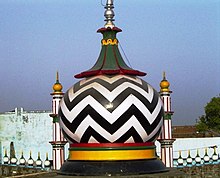Ahmad Riza Khan Barelwi
Ahmed Raza Khan Barelvi (born 1856 ;. Died 1921 ) was a Pashtun Qadiri -Gelehrter and leader of the barelvi , one by Sufism influenced orthodox- Sunni movement of the northern Indian town of Bareilly went out here and on the Indian subcontinent formed.
He is the author of numerous books on many Islamic subjects, he translated the Koran into Urdu in 1911 (title Kanz al-īmān fī tarjamat al-Qurʾān ).
Life
Khan was born on June 14, 1856 in Bareilly, northern India. His father, Naqi'Ali Khan, taught him Dars-i Nizami, the traditional Islamic study curriculum, from early childhood. The lessons were so successful that Khan was able to produce fatawa as early as 1869 at the age of 13. The production of these legal opinions became the main occupation of his life. In 1877 he became a student of the scholar Sayyid Shah Al-e Rasul, who died two years later. Khan continued his lessons with his grandson Nuri Miyan.
In 1878 he made a pilgrimage to Mecca and Medina with his father, fulfilling one of the five pillars of Islam. The leadership of the Barelwī movement was officially given to him in 1900. In 1904 he founded the Madrasa Manzar-i Islam . Khan died on October 28, 1921, and his grave in Bareilly has now become a center of pilgrimage as it is said to send out positive powers of blessing.
As early as 1915, Khan had selected his eldest son, Hamid Riza Khan, to follow him as the movement's leader.
literature
- Usha Sanyal: Ahmad Riza Khan Barelwi: in the path of the prophet. Oxford: Oneworld, 2005 ( Makers of the Muslim World ); ISBN 1-85168-359-3
- Usha Sanyal: Devotional Islam and Politics in British India: Ahmad Riza Khan Barelwi and His Movement, 1870–1920. Cambridge University Press / Yoda Press 2010; ISBN 9788190666862
- Thomas K. Gugler: Mujāhidīn of Islamic Mission: The Barelwī Tablīghī Jamāʿat Daʿwat-e Islāmī, (Ph.D. Islamic Studies Erfurt 2010) ( online excerpt ; PDF; 139 kB)
Web links
Individual evidence
- ↑ cf. Jamal Malik and B. Malik: Islamic History and Civilization, Islamic scholarly culture in North India. Brill Academic Pub (1997), p. 483 ( online excerpt )
| personal data | |
|---|---|
| SURNAME | Riza Khan Barelwi, Ahmad |
| ALTERNATIVE NAMES | Raza Khan, Ahmad; Aḥmad Raḍā Ḫān Barelvī; Ḫān, Aḥmad Raḍā; Brelvi, Raza Khan Fazil (LoC); Raza Khan Fazil Brelvi (LoC); Aḥmed Raza Khan Brelvi (LoC); Aḥmad Raza Khan (LoC); Shāh Aḥmad Raḍā Ḫān Barelvī; Rahmatullah Alaih; Raḍā Ḫān Barelvī, Šāh Aḥmad; Aḥmad Riḍā Ḫān (Enc. Islam); Ahmed Riza Khan (original); Ḫāṇ Barelvī, Aḥmad Riḍā (SWB-AK); Muḥammad Aḥmad Raḍā Ḫān Qādrī Barelvī (SWB-AK); Shāh Muḥammad Aḥmad Raḍā Ḫān Fādl Barelvī (SWB-AK); Raḍā Ḫān, Aḥmad (SWB-AK); Ahmad Riza Khan Barelwi (SWB-AK); Ahmad Riza Khan (SWB-AK); Aḥmad Raḍā Qādrī Barelvī (SWB-AK); Aḥmad Raḍā Barelvī (SWB-AK); Fāḍl Barelvī, Aḥmad Raḍā Ḫāṇ; Aḥmad Raz̤ā H̱ān Barelavī; Barelavī, Aḥmad Raz̤ā H̱ān; H̱ān Barelavī, Aḥmad Raz̤ā; Aḥmad Raz̤ā H̱ān Barelvī; Barelvī, Aḥmad Raz̤ā H̱ān; H̱ān Barelvī, Aḥmad Raz̤ā; Aḥmad Raz̤ā H̱ān Barelawī; Barelawī, Aḥmad Raz̤ā H̱ān; H̱ān Barelawī, Aḥmad Raz̤ā; Aḥmad Raz̤ā H̱ān Barelwī; Barelwī, Aḥmad Raz̤ā H̱ān; H̱ān Barelwī, Aḥmad Raz̤ā; Aḥmad Raz̤ā H̱ān Qādiri Barelavī; Barelavī, Aḥmad Raz̤ā H̱ān Qādiri; Qādiri Barelavī, Aḥmad Raz̤ā H̱ān; Aḥmad Raz̤ā H̱ān Qādri Barelvī; Barelvī, Aḥmad Raz̤ā H̱ān Qādri; Qādri Barelvī, Aḥmad Raz̤ā H̱ān; Aḥmad Raz̤ā H̱ān Qādiri Barelawī; Barelawī, Aḥmad Raz̤ā H̱ān Qādiri; Qādiri Barelawī, Aḥmad Raz̤ā H̱ān; Aḥmad Raz̤ā H̱ān Qādri Barelwī; Barelwī, Aḥmad Raz̤ā H̱ān Qādri; Qādri Barelwī, Aḥmad Raz̤ā H̱ān; Aḥmad Raz̤ā H̱āṉ; Imām Aḥmad Raz̤ā H̱āṉ; Muḥammad Aḥmad Raz̤ā H̱āṉ Barelavī; Barelavī, Muḥammad Aḥmad Raz̤ā H̱āṉ; H̱āṉ Barelavī, Muḥammad Aḥmad Raz̤ā; Muḥammad Aḥmad Raz̤ā H̱āṉ Barelawī; Barelawī, Muḥammad Aḥmad Raz̤ā H̱āṉ; H̱āṉ Barelawī, Muḥammad Aḥmad Raz̤ā; Muḥammad Aḥmad Raz̤ā H̱āṉ Barelvī; Barelvī, Muḥammad Aḥmad Raz̤ā H̱āṉ; H̱āṉ Barelvī, Muḥammad Aḥmad Raz̤ā; Muḥammad Aḥmad Raz̤ā H̱āṉ Barelwī; Barelwī, Muḥammad Aḥmad Raz̤ā H̱āṉ; H̱āṉ Barelwī, Muḥammad Aḥmad Raz̤ā; Aḥmad Raḍā Ḫān; Ahmad Riza Khan Barelwi |
| BRIEF DESCRIPTION | Pakhtun Hanafī Qādirī scholar and leader |
| DATE OF BIRTH | 1856 |
| DATE OF DEATH | 1921 |

